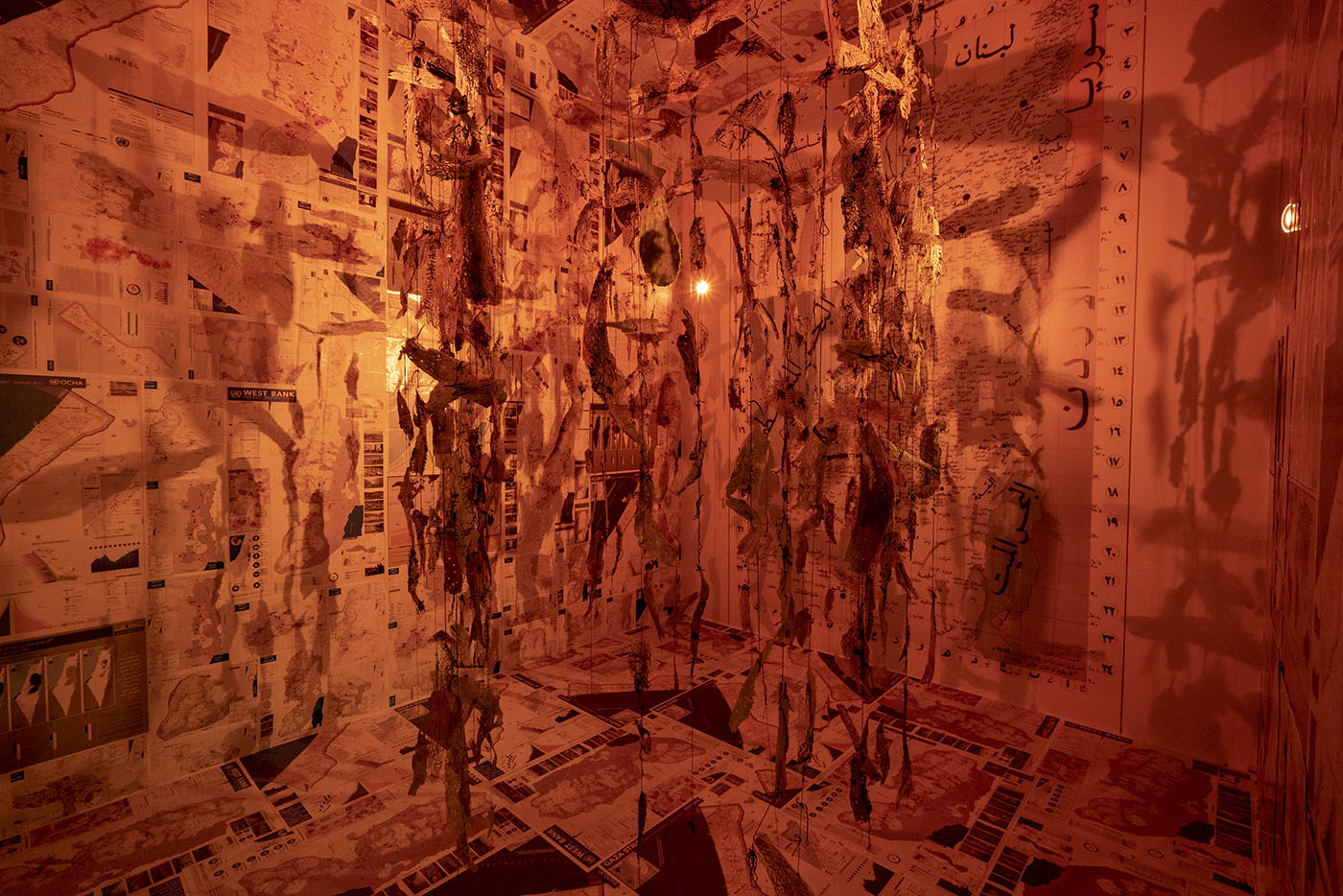
Asmaa Azaizeh
I am but one Word
Look father,
language is a lavish bed
and I slipped out of life’s vagina
onto an old step.
So in which language do I lament your death?
For twelve whole years
Al-Khansa’* stood at the school gate.
I gibbered after her,
like a parrot with no tongue
and every time, tears welled up in her eyes,
creatures with hardened skins
would walk across the desert of my eyes.
My mother cuts the mulberry tree
every time it grows,
so its roots don’t split the wall.
Which language can split
my sadness over you?
I picked the words
off the tree’s memory
of its long-gone limbs,
I plowed language
from the meadow’s fantasy
of its absent expanse.
Cats taught me their elegies
over the fetuses
that never formed in their wombs,
death tied me to the school gate,
asking for its share;
I am but one word
hopping on its short tongue
I am but a word I can’t make out
I will be spoken and be finished
If lamentation was meowing
or bleating
I would become it.
I would be a long wail
that summons my father
or a question that leads me
to him
I am but a name that stayed in God’s belly,
one that he forgot to teach Adam.
Let me know of other names
so I can say another.
Look father,
language is a lavish bed,
Al-Khansa’ sleeps on it like a ripe sphere
When I stand at its foot,
like an abandoned quarter
silence whistles through me.
And into my body,
on the tips of their toes,
come the elegies.
Translated from the Arabic by Mariam Hijjawi
* one of the most influential poets of the pre-Islamic and early Islamic periods. In her time, the role of a female poet was to write elegies for the dead.
Watch Asmaa Azaizeh recite her poem “Don’t Believe Me if I Talk to You of War” in Arabic:
The Eye of the Blackbird
The disc of my life will soon fall into my lap
Not much will happen after that
Those I wished I could meet have died
The country I dreamt of became a rap song in a distant car
The horses I raised as a child bit into my arm
and there is no sign they are letting go
At any event
My bottle of ink is large and it seems like I will not live long enough to empty it
The poems I wished writing I vitrified into his shrouds
I taught the octopuses that have climbed out of my back how to feel for his absence
I sit atop a rock of longing
and wait for the wind to give me shape
I may turn into a blackbird with a wide eye
a deep and wide eye
through which I shall see my new disc of life
and probably will not remember I was my own self
nor that this tree
which will become my home
was something unknown, as if it was my father.
Translated from the Arabic by Adam Zuabi
A Bed of Green Onions
Come look, my cat,
at my dull piece of ember
Each time I turn my back,
It’s covered with ash by time’s big hands
And I am like you in this darkness;
my pupils dilated,
my meowing stifled
in the chest of an old doll
Pupils crossed by ancient travellers
who never even heard
of the idea of arrival
Pupils of railways and cities
and whistles and leaving,
expansive as a meadow that lost
his father, the horizon,
and so went on forever.
I rode on the back of his untamed wind,
I spun my life into detective stories,
I dwelled forty bodies and left fifty,
I married twice,
I almost died
a thousand times in my dreams
If it weren’t for the scarecrow of loneliness
who punctured the silence of the night
I tattooed a Canaanite tablet on my back
and took to persuading people
that I was four thousand years old.
I built houses on hills that I did not know.
I lived in them,
then razed them to the ground,
then built others
I discarded men, and attracted others
I thought I had been killed
but my soul kept running
back to my chest
I politely threw love out,
and so he came back
through the window
I slaughtered the children that I thought up,
to escape the prisons of motherhood.
And motherhood watched from afar, delighted
I hid my father’s rifle
hoping that gazelles would one day rule us
but they were then skinned in our kitchen
Then God’s chosen people
began to choose
our heads one after the other,
dragging us to the big slaughterhouse
that we call freedom
My skin is mottled with joy and regret.
Each time I replace it
with a smooth dress
it is torn by sarcasm’s nails
and I am left naked
I have met poets
with whom I thought
that doomsday was upon us.
And that God had chosen us,
only us, to live
I have left men,
making them think
that they were bastards
and that they did not deserve love
except to lament their luck at its gate
And here I am
After all this, my mottled cat,
meowing mutely at the gate
of our little house.
The beautiful past lets me in,
I walk in the backyard
looking for the tail
of a fish I ate thirty years ago
The pomegranate tree is dead
but its shadow lives on,
my pupils dilate in its blackness
I crawl atop the wall
overlooking a bed of green onions
My mother’s hand weeds it
My father’s is buried within it
Translated from the Arabic by Mariam Hijjawi




Such powerful and painful poems. Thank you!